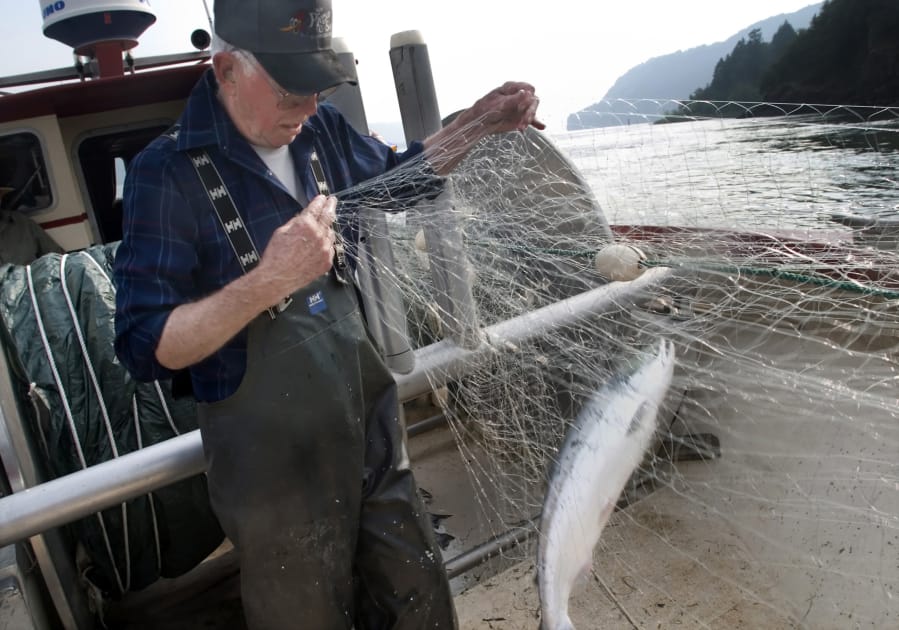The Oregon Fish and Wildlife Commission Chair, Mary Wahl, suspended on Jan. 17, the review of the Columbia River Reforms indefinitely.
The commission also deferred to ODFW Director Curt Melcher as to whether to change the spring Chinook allocation between commercial and sport fishermen, or to allow a spring commercial fishery on the Columbia main stem.
The Lower Mainstem Columbia River Fisheries Management Reforms were heavily negotiated and meant to ensure concurrency between the states of Washington and Oregon concerning salmon fishing rules on the Columbia River.
It also provides a mechanism to move gill and tangle net commercial salmon fishing off the main stem of the river, and into off-channel fisheries.
After five years, the states opened a review of the policy. Each state appointed three members of their fish and wildlife commissions to the Policy Review Committee, (PRC). The committee would then refer possible changes to the policy for eventual action by the full commissions.
Washington members of the committee voted to roll back parts of the policy in a controversial vote held in Spokane last March. That decision raised hackles, and there was considerable push-back from sport anglers, stakeholders that negotiated the original policy, and the Washington legislature.
Oregon governor Kate Brown reacted by replacing some members of that state’s Fish and Wildlife Commission.
Oregon members of the PRC now include Becky Hatfield-Hyde, Jill E. Zarnowitz, and Mary Wahl. The Washington members of the committee are David Graybill, Bob Kehoe and Don McIsaac.
On Jan. 18, the Oregon and Washington committee chairs discussed the ongoing effort, and the Oregon chair decided to table the review of the reforms indefinitely.
“The commission is working on a lot of other things.” Melcher said. “They have other priorities and it did not seem urgent from an Oregon perspective.”
That decision did not seem to sit well with some members of the Washington commission.
In the Washington commission meeting on Jan. 18, after the commission members had been informed about Oregon’s decision, commissioner Robert Kehoe requested that Washington ask Oregon to reconsider.
“I continue to be disappointed with the decision of the Oregon commission to withdraw from the joint PRC process, and I am still unclear as to how all that came about,” Kehoe said during the meeting.
The suspension does come with a caveat. The commissions have agreed to let the two state directors discuss the possibility of changes to the policy for this spring, including the potential allowance of tangle-net fisheries within the main stem of the Columbia during the spring season.
There could also be a shift in the allocation of spring Chinook harvest between the commercial and sport fisheries, which currently stands at 80/20, with the lion’s share going to the sport anglers. What has been discussed is a change in that allocation to 70/30.
Sport fishing guide Bob Rees does not like that aspect of the agreement.
“The Commission gave guidance that the directors can negotiate between themselves how the allocation will fall out,” Rees said. “That is somewhat of a dangerous precedent. It’s a bad idea, especially this year, when we are going to have depressed (salmon) returns again.”
Jim Wells of Salmon for All, an Astoria-based organization that advocates for commercial fishing, was unhappy about the suspension.
“Our reaction is that we felt that the PRC committee was the only way for the gill net fleet to get any kind of fair resolution out of the negotiations going on,” said Wells, “so we are very disappointed that it was suspended.”
As for the possible reallocation between sport and commercial anglers, Wells said the 20 percent that the commercial fleet gets is inadequate, and last year that small share caused multiple season closures. Also, there is no wiggle room in the current policy if the run comes in better than expected.
“Even if it’s a huge run on the river, we won’t get to access any of it,” he said, “and that’s a crying shame for the consumer.”
By Oregon rules, commercial fishing on the main stem in spring is permissible.
“Oregon policy allows tangle nets during the spring run,” said Melcher, “but given the run size (projection) it does not seem that there is much opportunity.”
“It’s highly unlikely,” he added.
For Rees, those words do not console, if the threat of mainstem commercial fishing is still real. He is especially concerned given the poor projections for spring Chinook returns.
“(Fishing) will be restricted again this year,” he said of the spring Chinook sport fishery on the Columbia. “We’ll be lucky to get 6 or 7 days into April.”
While sport anglers may celebrate that the process of altering the reforms looks to be dead, at least for now, the fact is that this issue is far from settled, and the review could be revived in the future. The final decision has yet to be made.




